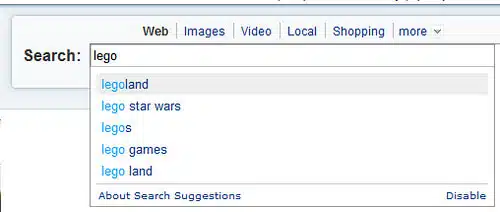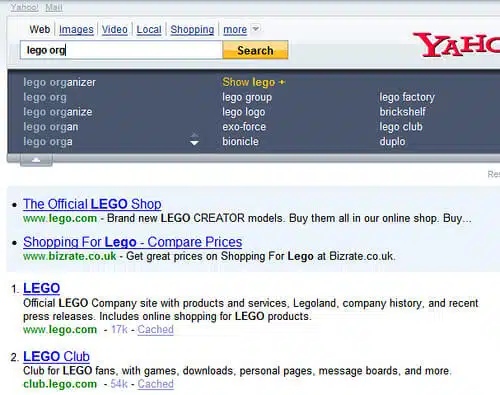Search Suggestions On Steroids: Yahoo Search Assist
I chuckled a bit over the buzz Yahoo got when they launched Yahoo Search Suggest earlier this month because I knew something even better was coming: Yahoo Search Assist. Finally, it’s going live and in the wild for lucky people who are selected at random for testing. If all goes well, eventually everyone will get […]
I chuckled a bit over the buzz Yahoo got when they launched Yahoo Search Suggest earlier this month because I knew something even better was coming: Yahoo Search Assist. Finally, it’s going live and in the wild for lucky people who are selected at random for testing. If all goes well, eventually everyone will get to use this new search refinement feature that I find very compelling.
Yahoo Search Assist is smart, in the sense that it shows up when you need it. Yahoo Search Suggest, as well as Google Suggest (and other tools like them), are cool in how they start to suggest things as you type. But often, you don’t need those suggestions. You get them because both tools are dumb. They don’t know how to appear when you really want them. They’re just always on.
Search Assist is selective. Ever had one of those moments when you start to type in a query, enter a word and then pause because you’re not quite sure what other words to add to it? Search Assist senses this. It notes that you’ve paused, takes that as a sign you need help and magically makes suggestions appear below the search box. Cool!
In addition, you don’t just get suggestions that contain some of the letters you initially type. Search Assist goes beyond the original word to suggest related topics. To do this, it brings back an old friend. AltaVista Prisma.
Cast your mind back to 2002, when AltaVista made one of its last attempts to remind people that it used to be the search engine of choice. AltaVista Prisma was a system that scanned the first 50 listings that were retrieved for any search you did, analyzed all the words in those pages and used them to pick out 12 additional terms you might want to try. Need some history? Here are reviews from back then from Pandia, Information Today, Search Engine Watch (written by Search Engine Land’s Chris Sherman, from when he was there) and ResourceShelf — along with the press release.
Search Assist operates similarly to Prisma, though the suggestions are based on the top 20 pages that are found for a search, rather than the first 50 results. In addition, the integration is much slicker.
Let’s go through some screenshots (plus a screencast below, for those who want to see it all flow together).
Here’s an example of regular Yahoo Search Suggest kicking in from the home page, as I search for [lego]:
Zooming in, notice how as I’ve typed, it has suggested some terms based on
the letters I’ve entered (legoland, lego star wars, lego, lego games…)
And this is the ordinary type of search suggestions you get on the results
page, after the words "Also try:"
Here’s how it looks with Search Assist:
Same suggestions, right? But imagine I’m thinking about something not listed,
like boxes to hold Lego. Actually, I am — I’ve been trying to organize all the
Lego we have with my sons this summer, and it’s a nightmare task.
I decide to search for [lego organizer], but I second-guess myself before
completing the second word. As I’m pondering, Search Assist decides I need some
encouragement. I get further suggestions that suddenly appear:
Notice how there are now two groups of suggestions. On the left are the
standard Yahoo Search Suggest ones, related to the actual word I’m typing. You
can see "lego organizer" among them. But on the right, under "Show lego +" are
terms conceptually related to the original search I did on Lego. These come from
common words from the first 20 results that were retrieved.
Now I’ve searched for [lego organzer]. If I want, I can open up more
suggestions from Search Assist:
A few last comments. Yahoo said that eye tracking research it performed found that Search Assist changed the classic "Golden
Triangle" scanning that people do in search results (China excepted!), where
they scan the first listing in depth, then the second a little less and so
on, perhaps not taking in the entire page. With Search Assist, the additional
topics seemed to make people think
more about what they wanted, Yahoo said. They took more time to review the
entire page and interact with the results.
Overall, I’m pretty excited about the new feature and looking forward to
playing with more. There have been so many times that I can recall doing that
exact hesitation, the pondering of what other terms I might want to add to my
search. Sure, they could just be added to the top of every page, but somehow
making them appear when it’s sensed that I want them feels more useful. I feel
more likely to consider them.
Want to try it out? You’ll have to hope your randomly selected. A small
number of Yahoo users will see this beginning today, and they will be the test
group over the next few weeks. Around the end of summer, if Yahoo feels they’ve
gained enough data and tweaked the tool more, Search Assist may roll out for
everyone.
Want to see it in motion? I made a screencast below. Hey, it’s my first one,
so it’s not wonderful — no narration, a few other issues. But you’ll get the point.
Contributing authors are invited to create content for Search Engine Land and are chosen for their expertise and contribution to the search community. Our contributors work under the oversight of the editorial staff and contributions are checked for quality and relevance to our readers. The opinions they express are their own.
Related stories





